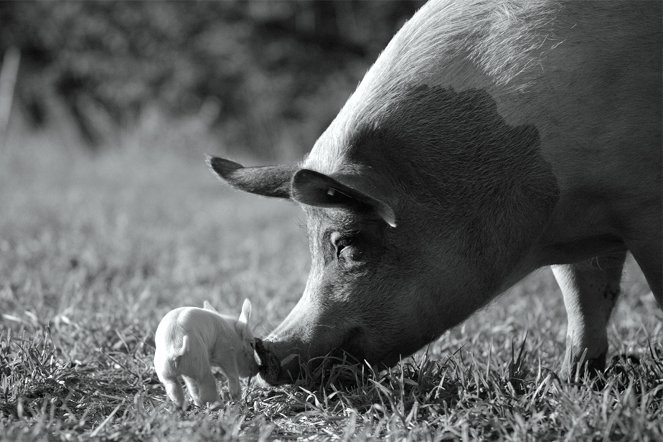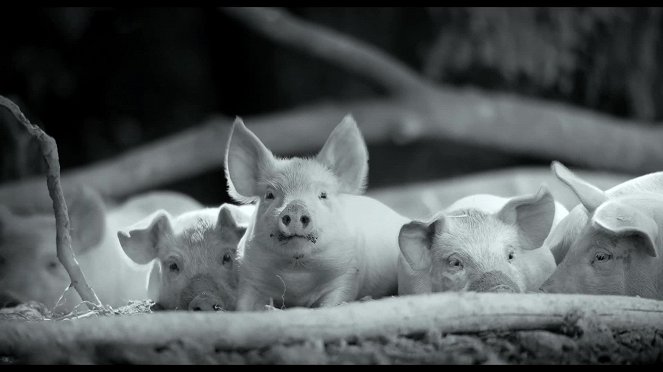Directed by:
Viktor KossakovskyPlots(1)
Gunda is the protagonist of this gentle black-and-white documentary triptych. She takes care of her little ones, accompanies them on a journey of discovery and then takes a break to recharge her batteries. She tentatively approaches the camera. Does she know what her fate is? What might she be thinking? What does she think of us? Gunda is one of several hundred million pigs that inhabit the planet, alongside a billion cattle, represented in the film by two gracefully mooing cows, and over 20 billion chickens, exemplified here by a one-legged chicken stumbling its way through the world. Whether rooting through the mud, swatting away flies or searching for worms, they all are heroes. And film essayist Victor Kossakovsky is and remains adamant: after this film meat consumption is impossible. His indignation about the ignorance of humans in general and the degradation of these creatures in particular flows into his conceptually minimalist, but visually brilliant meditation. Gunda is an intimate portrait. An intervention in the form of a modest gesture. A film that ascribes majestic greatness to the underdogs. And makes us think. In the very least. (Berlinale)
(more)Videos (3)
Reviews (3)
When people watch nature documentaries about, I don't know, polar bears, it’s boring but I get it because they probably don't get the opportunity to chase a polar bear in real life. But when I look at how domestic animals live in their climate zone, probably no more than 5 kilometers from the nearest living pig, I feel a little bit uptight. It's as if someone is reminding me that I should be vegan without necessarily having to get dirty and deadened by proximity to an actual pig pen. The endless piglet scenes reminded me of the moments when someone starts showing you pictures of their kids. Artistically, there's not much else, just a decent camera with huge resolution, adapting to the sympathetic fauna. Anyway, I commend the long dark ending and the decision to leave the film without music or any accompanying words.
()
Gunda is a vegan wanna-be art film about how even industrially farmed animals have personalities and emotions (wanna-be also because if I love animals and nature, I won't film them in black-and-white for God’s sake!). The film’s best scene is of the caged hens cautiously and curiously venturing into the grass outside and their perception of the sounds and variety of open space. It is a brilliant psychological moment. The epic slow-motion shots of the cows nicely highlight their majesty and, in the portrait shots, the individuality of their faces. In terms of content, however, their appearance suffers from lack of context within the film. The least interesting and, in places, even boring aspect is watching Gunda and her piglets, which, however, results in the film’s strongest moment, finally getting its point across. If the shots of the pigs were shorter and the “story” of the cows more meaningful, I would have given this four stars.
()
Gunda is very good at evoking all kinds of superlatives, such as in the official annotation and humorous slogans like “Babe in the style of Béla Tarr" and "behind the scenes of Wedding Trough”. This derives from its greatest virtue, but it has less to do with what the film is about than with its concept and treatment. In fact, in the context of modern cinema, it may seem like a revelation, as we are more likely to find parallels in the formats of YouTube and modern television. The ambient sound component gives the impression of ASMR videos and the action on the screen is reminiscent of slow TV, but with a more obvious dramaturgical and screenwriting element, which brings to the fore the themes of ecology, organic farms and, inevitably, the ambiguous relationship of civilisation and humanity to livestock farming and the ethics thereof. At the same time, however, it leaves a lot of room for viewers’ thoughts, which, like the animals on the screen, are given a relatively free range. Undisturbed by music, hectic editing and traditional milking of emotions or meanings, but concurrently stimulated by the moving and magnificently shot wallpaper on the screen, the mind begins to plant stories where there possibly aren’t any and to wander off in bizarre directions. The oft-mentioned screen is crucial in this, as it is only in the semi-darkness and with the relinquishing of control over the film provided to us by remote controls and keyboards that the desired calming of the senses can occur, enabling not only contemplation but also simply a relaxing release of the mind’s reins.
()
Gallery (13)
Photo © Sant & Usant



Ads